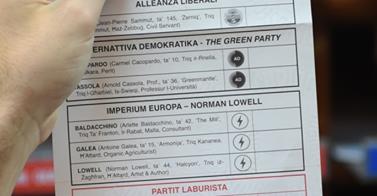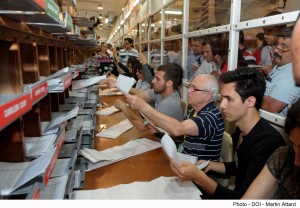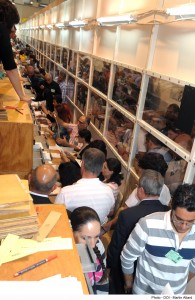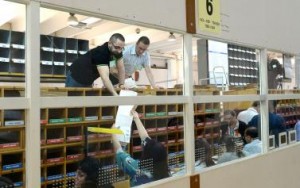
The thrill of the count
If you were exasperated and bored and wondering what on earth was taking so long to get all the counting of the votes done this week, spare a thought for those who were involved in the whole process. JOSANNE CASSAR spoke to a few party activists to find out more about what goes on at the Naxxar counting hall every time there is an election.
To an outsider, the sporadic television links and other media reports during the excruciatingly long process to manually count votes are the only glimpse we have of what takes place during elections. However, according to a Joe*, a PL party agent who has been involved in the counting process since 2004, being there is another experience entirely.
His job is to oversee the complicated counting process particularly throughout the inheritance of votes procedure. He describes the atmosphere at the counting hall and what makes it so exciting:
“First of all its the camaraderie with all the people involved, including those representing the opposing party. They are essentially three days during which, together with everyone involved, you share the joys, the sadness, the theories and debates and most of all the physical strain it entails. For those three days the counting hall becomes a world unto itself. Obviously there are also those hilarious moments which break the tension such as an impeccable speech by Zaren ta’ l-Ajkla or someone asking you if Labour was still in the running for winning the 5th seat!”
Despite the grueling hours spent at the counting hall, he sounds downright regretful that other duties called him away:
“I was there basically the whole of Monday and then between Tuesday afternoon until Wednesday morning. Unfortunately I had to miss out on being present throughout Sunday as I usually do, as I had other obligations throughout the day. However there were those who were there for shifts stretching well over 40 hours.”
I asked him the questions many have been asking: Would you prefer it if the system were changed so that the results comes out quicker, for example by digitally scanning the votes? Or should we consider changing it from the single transferable vote method to “first past the post”? Or do you prefer to leave it as it is, even though it takes so long to get the results?
Joe replies: “I definitely would not be keen on a first past the post system as it disenfranchises a big part of the electorate which, though not in the majority, would end up without appropriate representation. To be honest I am fairly partial towards our voting system based on the single transferable vote, however I will admit that something has to be done to speed up the counting process. Digital scanning is an option however there are many other minor changes which could be made which would lead to a more efficient counting process. In my mind there is no doubt that the parties should discuss improvements and changes in this regard.”
As for whether he would be there again for the next election, he does not hesitate for a second: “Most definitely.”
Not everyone I spoke to was involved in the actual counting of votes. Rita* was an assistant commissioner at one of the polling stations, and this was her first experience which she described to me vividly.
“It was very interesting, we were six ladies with different political affiliations; three of us were politically open because of our position at the table (red stamp, blue stamp and no stamp for the greens) and three were from the electoral commission so they could not divulge their political preferences and we got on like a house on fire. There was none of that aggressive rivalry which we usually find in political scenarios. One interesting moment for me was when a man with no fingers came in. We cleared out the room and closed it as per protocol. It was kind of tender; a tender moment of kindness if you know what I mean. But we were surprised, no shocked, when he voted for Imperium Europa. It was like a clashing of ideas: kindness towards a racist man, helping him vote for something you not only disagree with, but want to eliminate.”
“We had to sign endless envelopes and the PL kept count of the people who did not vote. I found this very intrusive of their privacy and quite worrying to be honest. After all the counting of voting documents and tallying with the electoral book, sealing of the boxes and envelopes (and signing them again) we had to take our lot to Naxxar.”
This was when the tiredness started setting in, and Rita found herself in a different atmosphere altogether.
“One room lagged behind so we had to wait for them to finish before getting on to our bus. Exhausted, we arrived in Naxxar to a sea of buses. Our hearts sank because we knew we had to wait in the line. It took another hour of waiting to get off which believe me at that time seemed like an eternity, I think I was hallucinating at that point”, she adds half-jokingly. “The cameras were rolling when we got off the bus, I hid my face with my massive envelope; I thought that was an invasion of my privacy too.Then we were literally taken on a wave of people just flowing, not really knowing where we were going. There were people everywhere even on the walls, but that may have been part of the hallucination. We stopped at a station where they checked our seals and envelopes and then pointed towards another station. People were shouting everywhere. I could see the counting hall, it was honestly larger than life. And then we were on the wave again to find ourselves outside and told to go to the dusty football pitch to find a bus home.”
Unfortunately, what had been a smooth process until now suddenly descended into chaos:
“The process was mad, people turned into animals fighting for a bus home. Everyone was tired and they only provided mini vans instead of keeping the big coaches which brought us there. Fights were breaking out, men pushing women out of the way to get their seat. I went from a civilised table of opposing view points to a sea of mad humans fighting to get home. Needless to say dusty and tired I did not even manage to drink the tea I made when I got home, I was out like a light sleeping a dreamless sleep until morning.”
Despite the rather unpleasant ending to her day, Rita still found it all very interesting. “I’m glad I did it, I’ll be happier when I receive my 160 euro payment and I might even do it again.”
In contrast to Rita, Anna* tells me she has been involved in the electoral process since she turned 18, making this her sixth time. She has been involved in local councils, the general election and even bi-elections as a counting agent.
“I’ve always been referred by one of the major political parties. (Having said this, my responsibilities are towards the commission as the commission is the body which appoints me). On each table there would be counting staff assigned by the PL, PN, and other parties if they choose to do so and some who are assigned by the commission. There are counting staff, supervisors, senior supervisors and calculators. What you see on TV is basically nine counting agents sitting on their respective chair (your chair is assigned from before so you cannot sit wherever you like), supervisors standing on both ends of the table, senior supervisors standing next to the supervisor racks, and the calculators are mainly sitting behind each table (in the centre of the big hall).”
Anna’s knowledge of the system has been passed onto her by her father who has always followed every election closely using the DOI website, and excel sheets to keep tabs on the results as they unfold. “The process was explained to me a good number of years ago and I started following it as much as my Dad, if not more! We follow the counts on the website, see who’s going to be eliminated, elected, who’s surplus is going to who etc. Mathematically, it’s very interesting and I’m an ex-Mathematics teacher, so I believe that explains it! At the hall obviously, you get to see everything happening on your table and your respective board which I believe beats hitting the refresh button every 20s on the DOI website.”
Anna would not miss being involved in this experience for the world: “The excitement is obviously at its best in a general election. Last year I was there for the shift in which the result was announced. At that point in time, you don’t hear a word at the counting hall, and the tension is at its worst. The major parties both have their ‘runners’ in the hall as well, who you can sometimes see next to the counting tables. These are usually administration members, or people who form part of the top members of the hierarchy in both parties.The party agents behind the perspex (one from each party watching every counting agent) will obviously be following every vote which goes into its respective pigeon hole.”
In this election, Anna says she had quite a tedious shift: “we had to empty the ballot boxes, open the ballot papers face down and put them in packets of 50s – which is actually quite boring. The most exciting parts were probably when the parties were getting their results through the agents, the moment when Alfred Sant was elected in the first count, and the chase towards the 6th seat. “
Anna was there from 4am – 1pm on Sunday, 3am – noon Monday and 3am – noon on Tuesday. Dispelling any misconceptions the public might have about overtime and exaggerated payments, she points out that, “You’re always paid for three shifts and if you fail to go to one of them you won’t get paid. However you’re not obliged to go on any subsequent shifts over and above the third shift. In fact, I believe my shift was called in again on Wednesday morning but I was working.”
When I ask her about her thoughts about our electoral system, Anna has very firm views. “Much has been said on the length of time this election took. The single transferable vote system is one of the best systems there is. You would be amazed to see for how long one vote keeps going on and on. It is also very fair and this is why we’ve kept it for so long. Local council election votes are counted using the same system, but they do not take as long. Neither does the general election if you compare electing 69 MPs to 6 MEPs, but this is a very particular election in itself (MEPs). This year we had a lot of idle time doing nothing for the simple reason that the votes have to be counted at the same time. Table 1, can’t continue the process if tables 2-13 aren’t ready.”
In order to best describe what was happening, Anna gives a concrete example:
“Take the votes of Kevin Cutajar (PN candidate for Gozo), he was obviously the most popular on the 13th district, with over 7000 votes I believe. Kevin Cutajar was obviously not as popular on the 4th district, so while the 4th district table had opened up his votes because he was eliminated, and sorted them for the next preference, the 13th district table was STILL sorting out his votes. Can another table help in this case? Yes, but they don’t allow it, it’s too much of a tense time and party agents don’t like votes crossing tables because of mishaps in the past. When the votes are sorted, they are also moved towards the left of the table so that one person is only assigned to one pigeon hole. After that, they have to be counted (one by one so that no candidate’s votes are mixed with someone else’s), they are then put into packets of 50s and THEN they have to be stamped with ‘count 7’ for example. Of course, all this takes a long time. In the meantime, tables 1-12 (except for table 13 who would still be working like crazy) are stuck on their tables doing nothing! In a local election or general election, each table would have its own system and does not have to wait for anyone else, hence we sometimes find that some districts close the counting process before others.”
Her conclusion is that it would be best to keep the STV system, “however I would try to find a better solution for the MEP elections as this will keep happening again and again. As to the digitalized system, I don’t even think my grandkids (I’m 25) will live to see it. We’re so into politics, and yet we don’t trust anyone when it comes to the counting of votes, so it would be VERY difficult to trust a digitalized system which I’m sure a lot would believe could be tampered with. We don’t even trust the policeman distributing the votes on his own, we have to send party agents with him – let alone having a digital voting system!”
It goes without saying that Anna will be there the next time there is an election.
For Neville Cassar, being in the counting hall for the MEP elections was a new experience. He is involved in the Nationalist’s party electoral office (ELCOM) and work in the counting hall falls under the responsibility of this office. His task was mainly to check each vote as it unfolded.
“When you have a passion for politics, being there makes you automatically tense, and tension creates excitement. When the real counting starts, the first minutes are the most tense. You can observe a surreal silence around you because every party agent is 100% focused on every single vote at that stage. Silence breaks only if there is a dubious vote and the party agent quickly points out his protest and instructs the counting agent to place the vote under the ”invalid” votes section so that the vote can be reviewed later by the electoral commotion. After the third sample, rumours begin to run from one agent to another about the first outcomes.”
Neville was not there as long as he would have liked to be because of work commitments.
“Some of my colleagues had to stay there for 70 hours but I had to return to work on Monday so I was only there for about 12 hours.”
Would he want the system to change? “It was very tiring and I think that an alternative way should be studied. But the current system is very very democratic and transparent.”
One thing is for sure, he has now been bitten by the election bug and will probably be there again next time.
Ethelbert Schembri is a PL party agent and this was his fifth time at the counting hall. He tries to put into words what it is about the whole process which is so addictive.
“I can’t speak for everyone but am sure many have the same feeling as I do. We do it because we love the party, both PL and PN agents. The atmosphere is electrifying, from the first second of sorting till the last count because every vote is valuable. Many of us make great sacrifices to be there; we stay away from our families for days, we take leave from work which costs us money. One of my colleagues even suffered an injury on Sunday and only went to hospital on Wednesday evening where they told him that he had a broken foot and ended up in plaster.”
Ethelbert’s role was to check each vote and to be sure PL votes were assigned to the voted candidate from the 1st to the last count. “On the first count we have a chit for every packet of 50 votes and with that, the party have a sample that can determine the majority of votes in a short time. We keep a watchful eye on everything that is going on on the other side of the perspex, and if we notice something wrong we use the perspex to get noticed.”
(He is, of course, referring to the famous ‘banging on the perspex’ routine that we see so often on TV).
“Each and every vote is valuable, so being entrusted to check the votes throughout the whole process is a great responsibility. As for the excitement, it may very well be exciting if one wins but over time, hour after hour it gets painful and tiresome. But we have our fun too, because one need to do something to fill those long hours of waiting and everyone could see some of the jokes that were going on.”
Ethelbert arrived at 10am on Sunday and except for a couple of hours when he went home to take a shower and change his clothes, he remained there for almost three days, and got out at around 8am Wednesday. “But there are people that stay even longer, much longer,” he is careful to point out.
As for his views on changing the system, “if we keep the present electoral system it would be hard to add the computer factor as the votes are filled in by people by hand and each vote has its own story to tell. But if all sides sit down and discuss a change in the electoral system so that is modernised and that will give us a quicker result, why not?”
As for whether there will be a next time, Ethlebert says, “I’m at the service of the party, so if they need me there I will surely be there. “
*these names have been changed at the request of the person being interviewed









